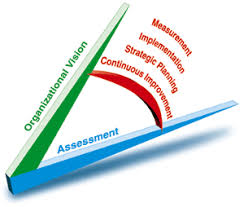9 Importance of Strategic Planning to SMEs
Strategic planning is a process set by organization to guide the day-to-day decisions and also for evaluating progress and changing approaches when moving forward. It is a system that helps you set an ambition for your business’ future and determine how best to achieve it.
Strategic planning is important to an organization because it provides a sense of direction and outlines measurable goals for an organization. In order to make the most of strategic planning, your company should give careful thought to the strategic objectives it outlines, and then back up these goals with realistic, thoroughly researched, quantifiable benchmarks for evaluating results.
The primary objectives of Strategic planning are to connect the below four key areas:
- Mission– defining your business’ purpose
- Vision– describing what you want to achieve
- Plan– outlining how you want to achieve your ultimate goals
- Evaluation – value achievement
The Mission
Strategic planning starts with defining a company mission. A mission is important to an organization because, it synthesizes and distills the overarching idea linking its practical strategies. It also enables management and employees to align the specifics of their actions and decisions with a clearly defined vision and direction, consequently saving time. Define your strategic mission in a way that is broad enough to guide both management and employees, and narrow enough to focus their efforts. “To help humanity,” is too broad a mission, even for a nonprofit. “To feed the hungry by connecting home gardeners with food banks,” is a mission that is both general and actionable.

The Vision
This is a clear, comprehensive ‘photograph’ of an organization at some point in the future. It provides direction because it describes what the organization needs to be like, to be successful within the future. A vision describes the “WHAT”. i.e. what you are trying to achieve in the future.
The nuts and bolts of the strategic planning process are expressed in measurable goals. Measurable goals set specific, concrete objectives expressed in terms of quantities and timelines. Measurable goals are important to an organization because they enable managers and employees to evaluate progress and pace developments. “To grow substantially during the next few years” is not a measurable goal, but “To increase sales by 30 percent during the upcoming year” provides a concrete objective to be achieved in a specific time frame.
The Plan
This refers to the process of identifying organization’s objectives, formulating and monitoring specific strategies to achieve them. It also entails staffing and resource allocation and is one of the important responsibilities of a management team.
The Evaluation
Evaluating the progress of Strategic objectives are of necessity based on the best information you have at the time and your most realistic assessments of what your company can achieve. Organizations also benefit from building a stage into the strategic planning process that involves evaluating goals and progress after an elapsed period of time in light of the company’s success in achieving these goals and developments that have arisen in the interim. For example, if you plan to grow your hardware store business 20 percent during a specific year, but a formidable competitor opens a superstore down the road, you’ll probably redefine your objectives and evaluate progress in terms of preserving market share, so that, the emergence of other store will not affect your plans.
Importance of strategic planning:
- Strategic planning is necessary to determine the direction for your organisation.
- It focuses your efforts and ensures that everyone in the business is working towards a common goal.
- To agree actions that will contribute to business growth.
- To align resources for better results
- Prioritize financial needs
- Build competitive advantage
- Engage with your staff and communicate what needs to be done
- Another significant purpose of strategic planning is to help you manage and reduce business risks. Owing a business is inherently risky, so, planning will help you to remove uncertainty, analyze, potential risks, implement risk control measures.
- Consider how to minimize the impact of risks, should they occur in business
What is the strategic plan?
Effective planning consequently results in a written strategic plan. This is a formalized document that describes your business’ goals, and the actions needed to achieve them.
You can use a variety of models and approaches in strategic planning. Many businesses include a SWOT analysis or a PESTLE analysis as one of the key elements of their strategic plan.
Other common elements are:
- vision and mission statements
- core values
- clearly defined goals and objectives
- action plans
You may also want to include an implementation schedule, key performance indicators (KPIs) and other accountability measures.
At SOW Professional Services, a leading Management Consulting firm in Nigeria, we understand the importance of strategic planning and can assist you with the transition. Call us on 07038254989 or request a cost-benefit analysis from our business managers. They can help you determine the right strategy(s) for your business.



